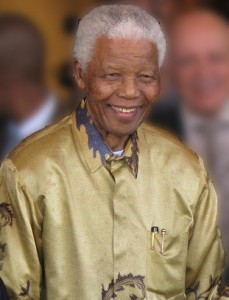 In a speech to Europe’s parliament, Nelson Mandela stated that “Great anger and violence can never build a nation. We are striving to proceed in a manner and towards a result, which will ensure that all our people, both black and white, emerge as victors.” Ever since Nelson Mandela was convicted of violently plotting to sabotage and overthrow the South African government and sentenced to life in prison, he has been a worldwide symbol for democracy and social equality. In 1990, as a result of immense pressure from foreign government officials, he was released from prison, and in 1994 he was elected President in the country’s first democratic and fully represented election. During his five years as President, Mandela strove to obtain reconciliation between whites and blacks. One of the many ways he did this was through the nation’s common love of sports, as is reflected in the 2009 film Invictus. He also created the Truth and Reconciliation Commission during his presidency to ensure the restoration of fair justice in the court system. His activism and determination for social equality has also had a great impact on theatre performance.
In a speech to Europe’s parliament, Nelson Mandela stated that “Great anger and violence can never build a nation. We are striving to proceed in a manner and towards a result, which will ensure that all our people, both black and white, emerge as victors.” Ever since Nelson Mandela was convicted of violently plotting to sabotage and overthrow the South African government and sentenced to life in prison, he has been a worldwide symbol for democracy and social equality. In 1990, as a result of immense pressure from foreign government officials, he was released from prison, and in 1994 he was elected President in the country’s first democratic and fully represented election. During his five years as President, Mandela strove to obtain reconciliation between whites and blacks. One of the many ways he did this was through the nation’s common love of sports, as is reflected in the 2009 film Invictus. He also created the Truth and Reconciliation Commission during his presidency to ensure the restoration of fair justice in the court system. His activism and determination for social equality has also had a great impact on theatre performance.
In a 2010 Modern Drama article by Florian Nikolas Becker called “Capitalism and Crime: Brechtian Economies in The Threepenny Opera and Love, Crime and Johannesburg”, Becker analyzes the effect that Mandela’s post-apartheid environment Mandela established had on the way theatre was created in South Africa.
Mandela’s death comes 5 months after his 95th birthday and following 67 years of activism. In his address yesterday, South African President, Jacob Zuma eloquently acknowledged that “What made Nelson Mandela great was precisely what made him human. We saw in him what we seek in ourselves.”
Comments on this entry are closed.